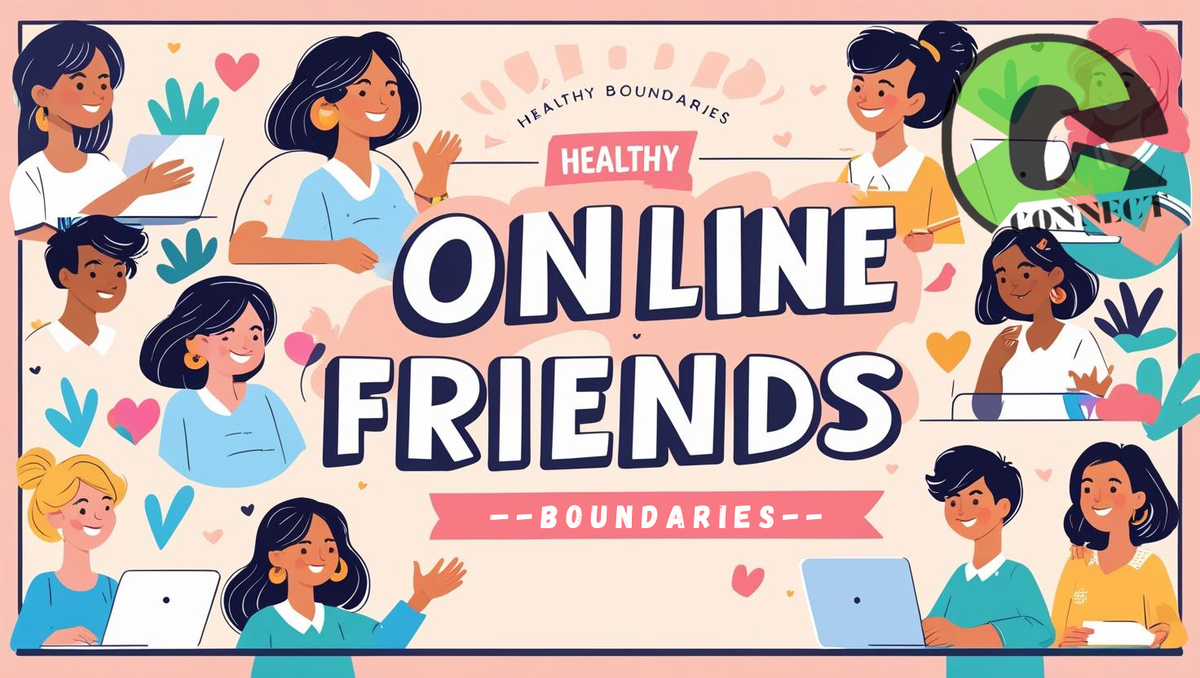How to have healthy boundaries with online Friends?

Setting Healthy Boundaries in Online Friendships
In the last decade, the way young people make and maintain friendships has changed dramatically. Online platforms — from social media and gaming apps to Discord, WhatsApp, and private forums — have become new-age playgrounds where relationships begin, deepen, and sometimes fall apart. For today’s youth, online friendships aren’t just side stories; they’re often central to their daily emotional landscape.
But with this digital closeness comes a unique set of emotional and psychological challenges. Unlike face-to-face friendships, online ones can evolve rapidly, blur personal boundaries, and sometimes leave individuals feeling drained, confused, or even manipulated. So how can one enjoy the benefits of online friendships while protecting their emotional well-being? The answer lies in setting and maintaining healthy boundaries.
Why Are Online Friendships So Alluring?
For many teenagers and young adults, online friendships offer something they may struggle to find in their offline lives — understanding, shared interests, and freedom of expression. Whether it’s connecting over niche hobbies, mental health struggles, or simply feeling seen without the pressure of physical appearance, online spaces provide a sense of belonging.
17-year-old Rhea, for instance, found her closest friend on an art-sharing platform. "She just got me. I could talk to her for hours. It was easier than opening up to anyone in real life." Her experience reflects a common reality — many young people feel more emotionally safe and accepted in online spaces than in their immediate environments.
The anonymity and flexibility of digital platforms also reduce social anxiety. You can curate your responses, hide your face, or log off when overwhelmed. For teens navigating identity, self-worth, or mental health issues, this can feel liberating.
The Hidden Risks of Boundaryless Connection
Despite their comfort, online friendships can quickly become overwhelming. Many young people find themselves answering texts at 2 a.m., feeling responsible for a friend’s emotional crisis, or sharing deeply personal details without realizing the long-term emotional toll.
Take the case of Aarav, a 16-year-old who met someone through a gaming app. What started as playful chatting became an intense, emotionally draining connection. "He'd get upset if I didn’t reply fast. I started feeling anxious every time my phone buzzed," Aarav shared. Over time, he realized he had compromised his sleep, studies, and peace of mind to keep the friendship afloat.
Unhealthy online friendships may involve:
- Emotional dependency or guilt-tripping
- Sharing too much too soon
- Pressure to always be available
- Crossing comfort zones, including topics of intimacy or mental health
- Neglecting offline relationships and responsibilities
These patterns, if left unchecked, can mirror toxic dynamics often seen in real-life relationships — but are harder to spot because there’s no physical proximity or accountability.
Recognizing When It’s Too Much
A helpful rule of thumb is this: if a friendship — online or otherwise — consistently leaves you feeling anxious, overwhelmed, or emotionally drained, it might be time to reflect.
Warning signs include:
- You feel guilty or afraid to take time for yourself
- You notice changes in mood after interactions with this person
- You feel you can’t say no to their requests
- Your routines (sleep, study, social life) are negatively impacted
The tricky part is that online friends may not intend harm. Often, both individuals are simply seeking connection — but without boundaries, that connection becomes unhealthy.
How to Set Healthy Digital Boundaries
Boundaries aren’t walls; they’re guidelines that help relationships thrive without compromising well-being. Here are practical steps to protect yourself in online friendships:
- Be clear about availability: Let friends know when you’re offline, studying, or taking a break. You don’t owe constant access.
- Limit emotional labor: If someone shares heavy topics frequently (like self-harm, trauma, etc.), encourage them to seek professional help. You are a friend, not a therapist.
- Say no without guilt: It’s okay to decline video calls, personal questions, or emotional discussions when you’re not comfortable.
- Avoid oversharing early on: Build trust gradually. Just because someone shares a lot doesn’t mean you have to match their pace.
- Check in with yourself: After chats, ask: "Do I feel better or worse? Energized or drained?" Your emotions are valid data.
If a boundary is repeatedly disrespected, it’s okay to distance yourself. Muting, unfollowing, or even blocking are not acts of cruelty — they’re acts of self-respect.
Building Healthy Digital Friendships
Online friendships can be beautiful and transformative. Many lifelong bonds have formed through digital spaces. The key is not to avoid them but to engage consciously. Relationships — virtual or real — should leave you feeling seen, supported, and safe.
Here’s what healthy online friendships often look like:
- Mutual respect for time and boundaries
- Shared laughter, support, and non-judgmental listening
- Ability to take breaks without fear of conflict
- Honest communication and mutual growth
"My best friend lives across the country. We met on a fandom forum," shared 18-year-old Tara. "We text almost every day, but we also know when to give each other space. That balance is what makes it real."
Final Thoughts
As the digital world continues to evolve, so must our understanding of emotional safety. Young people are not wrong to seek connection online — but they need tools to navigate it wisely. Healthy boundaries are those tools. They’re the quiet protectors of mental health, ensuring we show up in relationships without losing ourselves in them.
If you're in an online friendship, take a moment to pause and reflect: Does this relationship add to your life or drain from it? Do you feel free, respected, and seen? If not, perhaps it's time to draw a new line — not to disconnect, but to reconnect with yourself.


Comments ()